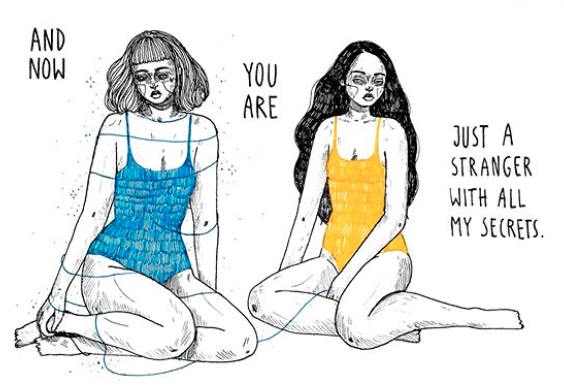Read the most important article on Elephant here.
This article is a part of a Therapeer Content Event, where many individuals (therapists and more) will be discussing and writing about different questions for the benefit of connection and education around mental health, therapy, and wellness.
~
I haven’t written in days.
I’ve been struggling with writing about a question that troubles me.
I’ve thought about this question on and on, over coffee, over tea, while walking Honda, the doggo. A few times while (don’t tell my coach) lifting. Actually, at this point, it’s been a month.
Is telling the trauma narrative necessary?
I know that at one point I would have wholly argued that telling the tale is. Yes. We have to in order to move on. Find safe people, tell them things, feel safer, and understood. Know that we belong. Connect through stories because human beings love and understand through stories.
Intellectually that works. Unfortunately, through experience, that’s not actually what I’ve found happens. Instead, what I end up doing is this: find people who are flawed but possibly safe, share, feel shame and disgust for saying too much, maybe get judged, maybe get hurt.
Then, I feel gross about the whole cycle.
Not an ideal situation when it comes to learning how to establish trusting relationships or even recover from the past.
So, I started trying something different. I pulled all the walls up, too afraid of being hurt again, and instead of telling any narratives, I took the pressure off. Maybe saying it matters, perhaps it doesn’t.
I decided to look at relationships differently: what if they can be based on not knowing things?
We switch the narrative—to feel better, we don’t need to share the big things. Instead, we share the small stuff (that stuff they tell us not to sweat but what we drip so much water over).
Basically, people don’t have to be completely understanding, they don’t have to know anything about us, and it’s okay to connect over something else, instead.
Talking about the moment: what’s hard. Or what’s mediocre.
I tell my coworkers how my studying is boring, and I end up cleaning the entire kitchen and grime off the burners to avoid it instead of broaching how I cried for two hours about not getting the parenting I wanted when I was growing up.
Or, with my lifting buddies, I discuss how sometimes my roommate and I both stress clean so much that we run out of things, and I start moving furniture around. I break my wooden dresser, find a leak ruining my other dresser (plus roots growing in my carpet—yum), and rip the back off my glossy black bookshelf.
Instead of broaching how I feel like I don’t fit in with them.
Or I chat with my roommate about how sometimes I stutter when trying to talk to people who I can’t quite predict or read well, and how that’s scary and prevents me from communicating as effectively, or makes me look awkward.
Instead of telling her I feel like I don’t show up for her well enough.
Which I am—no, I’m not—okay fine, yes, I’m awkward.
Instead of dealing with the big things, we talk about the real small life stuff that we deal with on the day-to-day. What’s on our minds.
I rant about my roof neighbors making too much damn noise, instead of the fact that I struggle to sleep. That way, I get a tad bit of connection about things most people to relate to, even though I’m still afraid to get closer.
And a big part of healing from trauma is connecting to ourselves and others. If we’ve had relational trauma, we are afraid of relationships. At the end somewhere, we have to heal that fear of relationships, so we heal in relationship.
Maybe we do that by telling people our stories, but I think that’s heavy. That’s scary, that’s too much for someone who can’t trust that other people won’t hurt them, or drop their coffee, or share with others things they aren’t ready to share yet.
If people are going to hurt us, and we fear that, how are we supposed to share with them our deepest darkest secrets?
We don’t. We probably can’t. And it perhaps wouldn’t help.
So we talk about the day-to-day.
We tell our new therapist about this show we’re watching about two old ladies living together after their husbands divorce each of them instead of the fact that we might have outgrown our significant other.
We tell our coach about how our headphones won’t come in, instead of addressing the fact that we can’t squat right now because it’s too something, and we don’t know how to fix it.
Or, we tell a friend about how our dog was super cute yesterday and put her toys away after she was done playing with them, instead of talking about the hour we spent crying because we didn’t get into some future career.
Because directly asking them for help, or guidance about something is likely not going to feel safe or natural. But talking to our friends, our people about something is what we want to do. A connection is necessary.
Circumvent.
Build a little trust, then build some more.
Brené Brown said that trust is in the little things, not the big ones. And I think healing is in the little things, too. There is no one big sweeping conversation that’s going to fix things. No one sharing of a story that makes the past less harmful.
But maybe, hopefully, a bunch of small ones can.
~
~


 Share on bsky
Share on bsky





Read 14 comments and reply